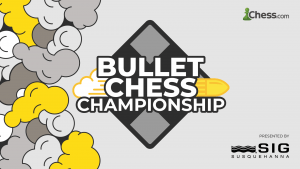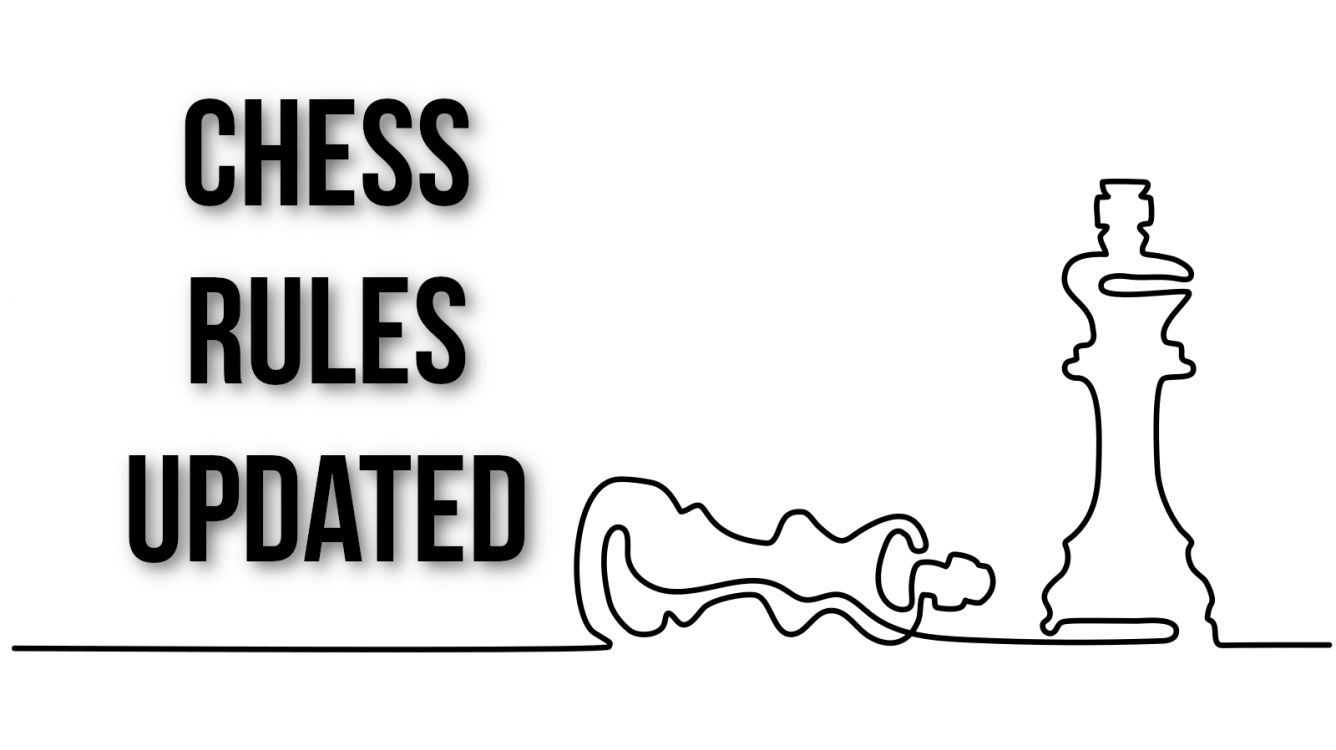
Official Rules Of Chess Updated, Draws Removed
Edited April 2, 2021: Happy April Fool's everyone. Stay safe!
Chess has a long and distinguished history spanning millennia. While the rules have gradually evolved over the last 1500 years, the last major rule change extends past living memory, to approximately 1860, when the rules as outlined by Staunton became generally accepted, and all agreed that white moved first, stalemate was a draw, and pawns could capture en passant.
For more than 150 years, the rules of chess have served their purpose well, but today, top-level classical tournaments and matches have been increasingly dominated by draws, leaving viewers frustrated and feeling cheated of excitement. This problem culminated in the 2018 World Chess Championship between GMs Magnus Carlsen and Fabiano Carauana, where all 12 classical games were drawn.
To address the "draw problem" in classic chess, FIDE, the governing body of chess since 1924, has taken the radical step of prohibiting all draws. The new rules take immediate effect. This surprising rule change has generated massive discussion on social media with strong proponents and opponents of the change voicing their thoughts. The term "New Chess" and the associated hashtag, #newchess, have even risen to become the #1 trending topic on Twitter.

To implement this rule change, FIDE has taken a simple approach. All regulations within the rules of chess which result in a draw have been replaced by new regulations that guarantee a decisive result.
The first such change is straightforward. All draws by agreement are prohibited; players may no longer make draw offers or agree to draws. Even in the case that play reduces to the most boring rook endgame conceivable, players will be required to play the game to a conclusion on the board. Removing the possibility of offering a draw also addresses a common behavioral complaint for both online and over-the-board players. Your opponent cannot pester you with repeated draw offers if there is no such rule!
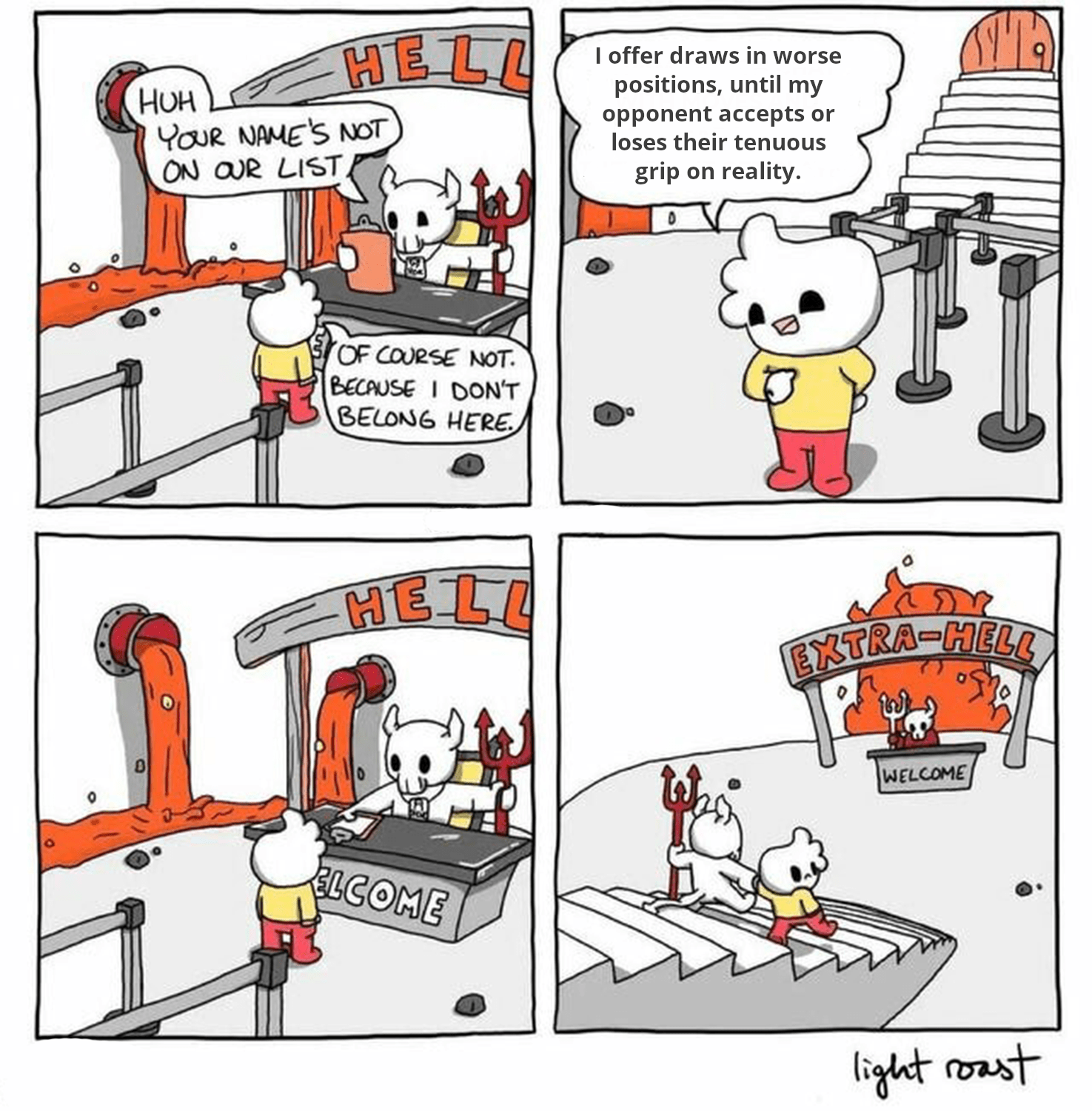
GM Jon Ludvig Hammer wrote about the idea of abolishing draw offers some time ago, and although some grandmasters initially dismissed his proposal as a "gimmick," the world will now be able to see the results of this rule change first-hand.
A slightly more controversial decision was made to the age-old rule, stalemate. Stalemate will now be a win for the dominant player, the player who has deprived his opponent of all legal moves. FIDE VP, Nigel Short, and Chess.com's own Sam Copeland agree with this rule change. Critics lament the fact that moments like the following will never occur again:
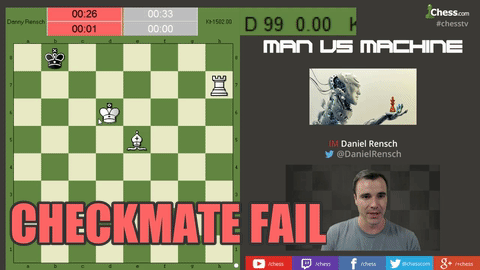 The next drawing rule to be stricken from the rulebook is threefold repetition. Under the new rules, if a position is repeated three times, the player who makes the third repetition will lose the game, and to discourage such a faux pas in future, they will be awarded the underutilized FIDE title, CM, which will now stand for "Cowardly Master," denoting players who lacked the courage and fortitude to play for a win at all costs.
The next drawing rule to be stricken from the rulebook is threefold repetition. Under the new rules, if a position is repeated three times, the player who makes the third repetition will lose the game, and to discourage such a faux pas in future, they will be awarded the underutilized FIDE title, CM, which will now stand for "Cowardly Master," denoting players who lacked the courage and fortitude to play for a win at all costs.
Anish Giri proudly voiced his support for these impactful changes by FIDE.
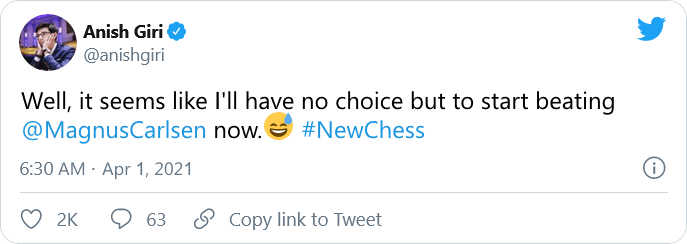
The next rule on the cutting board was the 50-move rule which states that if no pieces have been captured and no pawn moves have been made for 50 moves, the game will end in a draw.
This limit has been erased completely, meaning that games can theoretically last for an unlimited number of moves. To ensure that games do not continue indefinitely, a clause has been added asserting that after move 101, each player will take turns kicking each other in the shin once per move until a player pleads for "mercy" or falls out of their chair.

In light of the new rule, many top GMs, including Maxime Vachier-Lagrave and Levon Aronian, are upping their exercise regime and working out for hours each day to prepare for the intense focus they will need in the coming games. Aronian commented that the new chess rules will bring out the physical aspect of chess, and he hopes these changes may finally get the ancient board game into the Olympics.
“The shin-kicking rule really puts a needed focus on endurance in chess,” said Vachier-Lagrave. “If you don’t have the focus, stamina, and shin-power to play 400 moves without a break, then I don’t know if chess is for you.”
If you don't have the focus, stamina, and shin-power to play 400 moves without a break, then I don't know if chess is for you.
— Vachier-Lagrave
GM Hikaru Nakamura assisted in a test tournament which tested the elimination of the final drawing rule, insufficient mating material. This rule has been altered by allowing lone kings to capture each other. In the final game against GM Vidit Gujrathi, both players were down to just their kings and a few pawns and running out of moves. But suddenly, Vidit misplayed, and Nakamura was able to capture his king for the win. “It feels really satisfying to finally be able to capture Vidit's king,” said Nakamura when asked about the experience. “It seems logical that the king is the new juicer."
Despite widespread acclaim, not all players are ready to accept these rule changes. Russian GM Ian Nepomniachtchi says the new rules are “a joke,” and that he “doesn’t believe them.” He plans to continue playing #oldchess exclusively.
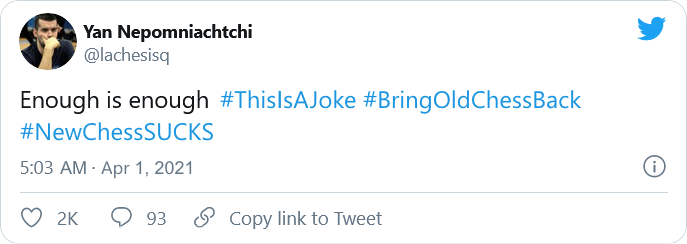
When asked whether #oldchess would be added as a variant on Chess.com, Chief Chess Officer IM Danny Rensch said that the development team “doesn’t think there will be much interest in that.” Rensch added: "People need to embrace the future. #newchess is the best thing since the invention of CrossFit, and it's here to stay."

